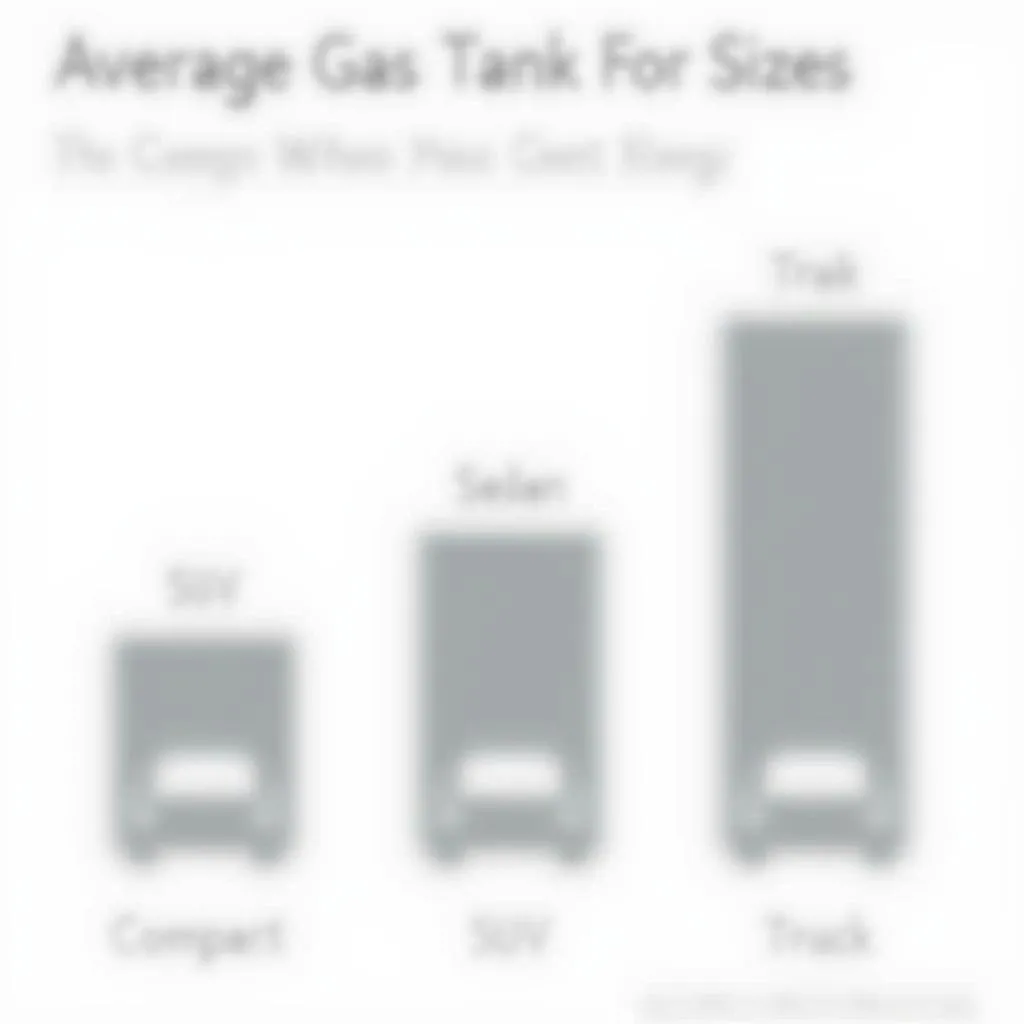You hop in your car, punch in the destination, and glance at the fuel gauge. Half full. Or is it half empty? But the real question is, how many gallons are actually in your car’s gas tank? The answer, like many things in the automotive world, isn’t one-size-fits-all.
 Car Gas Tank Sizes Comparison
Car Gas Tank Sizes Comparison
Decoding Your Car’s Fuel Tank Capacity
Your car’s fuel tank size isn’t random. Manufacturers consider factors like vehicle size, engine efficiency, and intended driving range when deciding how much fuel a car should hold.
What’s the Average Gas Tank Size?
While there’s no universal standard, most passenger cars have gas tanks that hold between 12 and 16 gallons when full.
- Compact Cars: Typically hold 12-14 gallons. Think Honda Civic or Toyota Corolla.
- Sedans: Often fall in the 13-16 gallon range, like a Honda Accord or Toyota Camry.
- SUVs: Can vary greatly, from 16 gallons up to 28 gallons or more for larger models, like a Chevy Tahoe or Ford Expedition.
- Trucks: Similar to SUVs, with full-size trucks holding 25-36 gallons or more, depending on configuration.
 Chart Illustrating Average Gas Tank Sizes
Chart Illustrating Average Gas Tank Sizes
Finding Your Car’s Fuel Tank Capacity
Several ways exist to crack the code of your specific car’s tank size:
- Check Your Owner’s Manual: This trusty booklet usually has a section dedicated to fuel capacity, often listed in gallons or liters.
- Look Inside Your Fuel Door: Some manufacturers conveniently print the fuel tank capacity on a sticker located inside the fuel door.
- Search Online: Automotive websites and forums can be valuable resources. Enter your car’s make, model, and year to find information about its fuel tank size.
Why Knowing Your Fuel Tank Size Matters
Beyond satisfying curiosity, understanding your car’s fuel capacity has practical implications:
- Estimating Fuel Costs: Knowing your tank size helps calculate fuel expenses for trips, especially useful with fluctuating gas prices.
- Planning Fuel Stops: A clear understanding of your car’s range prevents getting stranded with an empty tank, particularly on long journeys.
- Monitoring Fuel Efficiency: Tracking how many miles you drive per tank allows you to monitor fuel economy and identify potential issues early on.
FAQs: How Many Gallons in a Car?
Here are some common questions and answers about car fuel tank capacity:
Q: Do all cars of the same make and model have the same gas tank size?
A: Not necessarily. Even within the same model, different trim levels or engine options may have varying fuel tank sizes.
Q: Can I increase my car’s fuel tank size?
A: While aftermarket larger fuel tanks are available, it’s strongly discouraged due to safety concerns and potential damage to your vehicle’s fuel system.
Q: Does using premium gas increase my tank’s capacity?
A: No, using premium gas doesn’t magically expand your tank’s size. It simply refers to a higher octane level, which may be recommended for certain high-performance engines but doesn’t affect the actual volume of fuel your tank can hold.
Need Help with Your Car’s Fuel System?
Understanding your car’s fuel system, including its tank capacity, is crucial for a smooth driving experience. If you have any questions or concerns about your car’s fuel system, don’t hesitate to contact us.
WhatsApp: +1(641)206-8880
Email: [email protected]
Address: 276 Reock St, City of Orange, NJ 07050, United States
Our team of experts is available 24/7 to provide assistance and address any questions you may have. You can also check out our other helpful articles, such as “wash wand for car” and “race car gas tank” for more car-related tips and information.
